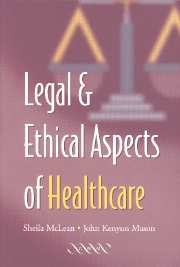Book contents
- Frontmatter
- Contents
- Acknowledgements
- Dedication
- Preface
- A Note on Abbreviations
- 1 About Medicine and the Law
- 2 Resources – Who Decides?
- 3 The Confidential Relationship
- 4 The Therapeutic Partnership
- 5 Refusal of Consent
- 6 Medical Negligence
- 7 Using People for Research
- 8 Assisted Reproduction
- 9 Genetics and Pregnancy
- 10 Termination of Pregnancy
- 11 Genetics, Insurance and Employment
- 12 Is Life Worth Living?
- 13 Disposal of the Body and Body Parts
- 14 Sex, Gender and the Law
- 15 Mental Health and Mental Capacity
- 16 The Law and the Elderly
- Index
16 - The Law and the Elderly
Published online by Cambridge University Press: 24 August 2009
- Frontmatter
- Contents
- Acknowledgements
- Dedication
- Preface
- A Note on Abbreviations
- 1 About Medicine and the Law
- 2 Resources – Who Decides?
- 3 The Confidential Relationship
- 4 The Therapeutic Partnership
- 5 Refusal of Consent
- 6 Medical Negligence
- 7 Using People for Research
- 8 Assisted Reproduction
- 9 Genetics and Pregnancy
- 10 Termination of Pregnancy
- 11 Genetics, Insurance and Employment
- 12 Is Life Worth Living?
- 13 Disposal of the Body and Body Parts
- 14 Sex, Gender and the Law
- 15 Mental Health and Mental Capacity
- 16 The Law and the Elderly
- Index
Summary
Projections for the future are always difficult but the Office for National Statistics states that the proportion of persons over the age of 65, which reached 16 per cent of the population in 1996, is expected to go on rising quite steadily so that the proportions of those aged more than 65 and those younger than 16 will be much the same in about 15 years' time. After this, there will be more old people than young. Very soon, it seems, there will be as great an overall need for ‘elder’ law as there is for child law.
When one adds to this that the elderly are, almost by definition, on the downslope of health and that, as a result, they become increasingly frail and vulnerable with time, one can appreciate even more clearly the need for their protection within a medicolegal context. And yet, what little legal involvement there is tends to aim at containing ‘difficult people’ rather than at recognising the autonomy of the aged and improving their self-esteem. The difficulty of so doing, of course, lies in the fact that all peoples' mental and physical capacities degenerate with age – and do so relatively steadily, albeit at different rates. At the same time, the capacity to generate income fails, savings get eaten away and poverty increases.
- Type
- Chapter
- Information
- Legal and Ethical Aspects of Healthcare , pp. 225 - 238Publisher: Cambridge University PressPrint publication year: 2003



